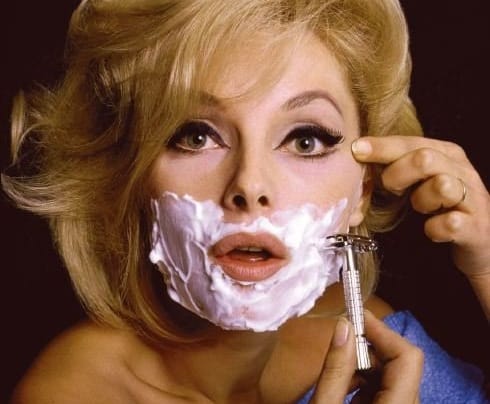Recently, the topic of women’s body hair has triggered discussion in the social media. You may remember that Allegra featured the story of the bearded lady who was respected by her peers because of her beard, and once the beard was gone, so was the respect she had earned thanks to her masculine appearance. The opposite perspective on female body hair is portrayed in a Veet commercial where a beautiful woman turns into an obese hairy man when she forgets to shave. Men then feel disgusted by her hairy appearance, viewing her as an unattractive man.
In order to address the cultural and social pressures women face as a result of such stereotypes, Madonna released on Instagram a photo of her unshaven armpits, and likewise Ben Hopper’s photographs of ordinary fashion portraits that include hair growing wildly out of women’s’ armpits address social expections about women’s body hair.
Rather than analysing the issue of women’s body hair from the a political feminist studies perspective, I would like, instead, to say something about the positive psychological aspect of this issue. To explain a little about what this perspective of positive psychology entails, I quote Elina Penttinen’s ‘Joy and International Relations’ (2013, chapter 1), who promotes an ontology of joy instead of disease:
“Positive psychology is built on questioning the validity of the illness approach or disease model in psychology and creating rigorous research on well-being, happiness, gratitude and positive emotions, in order to learn more about human potential and increase well-being.”
When we discuss a topic such as female body hair and its removal, we need to consider the political and cultural contexts in which such concerns are expressed. Both men and women are constrained by politics and culture. Thus, the question of female body hair is presented as a matter of aesthetic representations, which are socially constructed. By resisting this ideal type of beauty by proudly growing their body hair – as in the case of Madonna and the women depicted in Hopper’s photographs – women can be seen to access freedom from the imposition of society’s definition of beauty. When understood this way -as action specifically conducted in opposition to social and cultural trends -we either shave in order to comply with the ideal of a woman as hairless, or we resist this by not shaving because it proves our progressive feminist character. Either way we choose, the decision seems to be directed to us from above.
I wish, therefore, to discuss the the ‘self’ as a product of culture with self-empowering agency. This choice to remove or to grow hair can thus be imagined not only as a problem women face as their lives are being controlled and manipulated by man-made industries and cultures. We can instead focus on agency and empowerment and change our perspective of the human being and her capacities. In the spirit of positive psychology, instead of seeing people as weak, or as victims, we can see them as strong persons capable of self-definition. When we see people as capable, we can observe how they break the limits set by themselves and their environments. We can see the world anew.
In fact, we can go one step further and break the myth of body hair as problem that only affects women. Social media has helped to create beauty ideals for young men too: they, too, now have to be hairless so that young men are increasingly affected by social and cultural expectations about body hair.
It should also be noted that body hair removal is a personal matter that affects all of us as capable human beings. Some of us might need to remove our body hair for reasons of comfort, pleasure, skin reactions and so forth. There is of course also the possibility that some people are unaffected by the opinions of others and external pressure when it comes to matters of body hair, and they are agents in their own right . Body hair removal should not therefore be seen unambiguously as a female weakness and neither should female body hair be simply conceived as a sign of emancipation.
If we take the perspective of positive psychology – human beings as capable and not weak – we can shift our perspective from observing that which is unacceptable in the world (or the person) into that which accepts multiple understandings of the world (or the person). Instead of criticising the beauty industry for forcing women and men to engage in needless body hair removal practices, we can take a non-conflict approach to the issue by observing it from an a-political perspective. This may seem like an odd perspective from a political scientist like me, but it’s somehow refreshing!
So here is the positive evaluation of body hair removal: I think it’s great if someone feels liberated by the courage to grow hair. We can be inspired by such strength of character and even if we still like to remove our own body hair, we can transform that life-state of liberty and freedom into something else that we feel the need to challenge in our lives; maybe going out with or without make up, dressing up how we would like, being kind in a competitive environment, or pushing for a high-risk research agenda. In other words, we should feel encouraged to break the limits of socially constructed habits of being in the world, if that is what makes us happy. We should encourage others, especially our children, to have the strength to be themselves in the midst of social conventions.
Because if there is one thing I wish from this world it is respect for the self and the other through displays of compassion.. Admiration and a celebration of difference should be paramount instead of fear -body hair or no body hair – we should not pass judgment on others.
Finally, it is worth watching the Veet commercial and then seeing Hopper’s photographs, and taking a minute or two to reflect on the sensations they arouse in ourselves. After all, the feelings such images raise are much more telling than any intellectual analysis that we may be able to offer.





